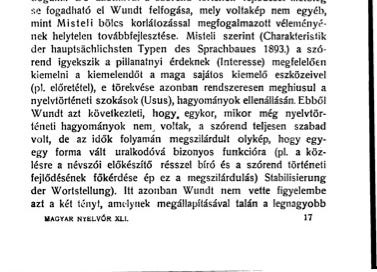Yesterday, I posted about the textbooks that Árpád Gerbner’s wrote. But that’s not all I found.
In 1912, when Árpád Gerbner was 27 or 28 years old, he published an article for the journal Magyar Nyelvőr, the premier journal for Hungarian linguistics. This journal, which was founded in 1872 and is still in print today, is peer-reviewed and extremely rigorous. It’s a journal for academic linguists who want to publish new theories. It’s where scholars debate Hungarian grammar and settle disputes about sentence structure.
I was very excited to find Árpád’s article. I have always been fascinated by linguistics, and I love learning languages. I’m especially intrigued by the way that language structures our thought, and while I don’t know Hungarian, I know it is a very unique language with an uncommon grammatical structure.
I tried to send Árpád’s article through Google translate, and it made absolutely no sense. So I sent the article to a professional translator last week. After reading it, she suggested that instead of a word-for-word translation, it would be better for her to just explain Árpád’s argument, since Hungarian grammar is so different from English (and his argument is very complicated).
It turns out that his article is all about noun and verbs. The title, A szórend tényezői, can be translated as “Factors of Word Order,” and it argues that German linguists, especially Wilhelm Wundt, have overlooked the importance of the placement of nouns and verbs when understanding language structure.
Wundt! I knew that name: the German psychologist, philosopher, and linguist. I searched back through my own files, and found that in my graduate school applications from 2005, I wrote about how I wanted to study his theories. I was more interested in how Wundt understood and explained religious experience, but of course this also has a lot to do with language and expressability. In any case, it felt like another point of connection between myself and Árpád.
But back to Árpád’s article: unlike Wundt, who argued that the basic “unit” of language is the sentence, Árpád argued that historically, nouns would have been the first words to develop, and therefore, there was never a time when word order was “freely built.”1 Instead, nouns developed first, and then verbs.
Árpád also took issue with Wundt’s theories about reason versus emotion. While Wundt considered the rational mind to be superior, Árpád argued that all of our actions begin unconsciously, and we only become conscious of them over time — in other words, emotion cannot be overlooked or underestimated.
This article warms my heart. I think because it reminds me of myself in my mid-twenties, the same age that Árpád was when he wrote this. I go back to my grad school application essay again, and I find the paragraph I wrote about why I studied Sanskrit for two years in college:
The structure of Sanskrit intrigued me: I learned that written Sanskrit was created in order to preserve a religious oral tradition, and the alphabet was organized according to the place in the mouth where a sound is produced. This structural preference for pronunciation in Sanskrit, and the repercussions of this system on the possibilities for linguistic expression, opened my eyes to the importance of linguistic systems in analyzing social interaction.
I imagine a different life, in which I studied linguistics, or linguistic history, or psycholinguistics. But the fields have changed so much since Árpád was writing: I sat in on a linguistics class in college and realized it was not for me. Same with philosophy. Their methodologies have become too narrow and constricting. It was in departments of Religion and History that I felt like I could write, think, and research with more freedom.
I realize that Árpád was born almost exactly 100 years before me. Then I go back to 1912, to the Austro-Hungarian empire just before the first World War. I try to imagine Árpád writing his article about nouns and verbs at a desk in Petroszény, the small town in current-day Romania where he taught in the local high school. Why did he feel driven to write such an academic argument? Had he hoped to study further, perhaps get a PhD? What other life he could have lived?
For more on the history of Wundt’s theories, see Arthur Blumenthal, “The Emergence of Psycholinguistics,” Synthese 72:3 (1987), 313-323.





The connections are fascinating. Especially the love for grammar - who knew it was on Dad’s side, not just from Mom!!